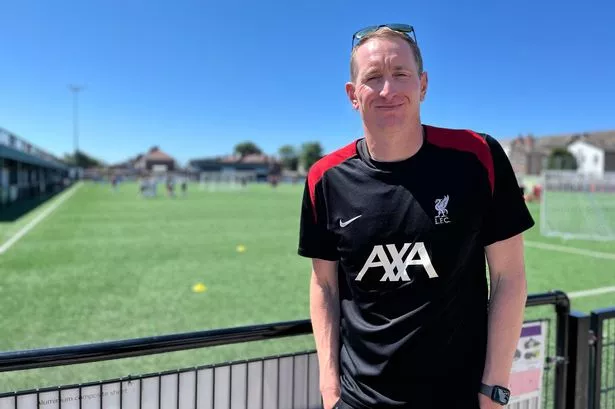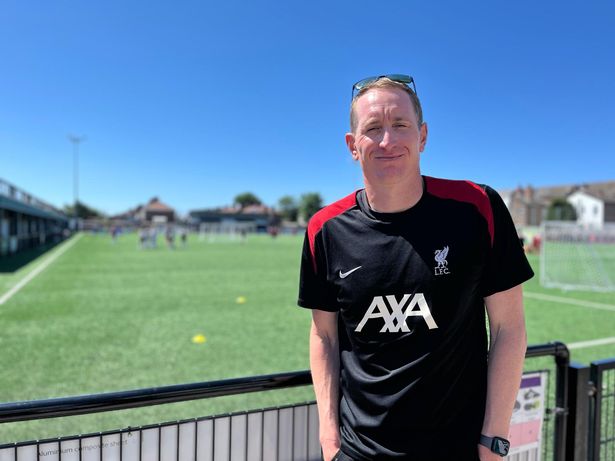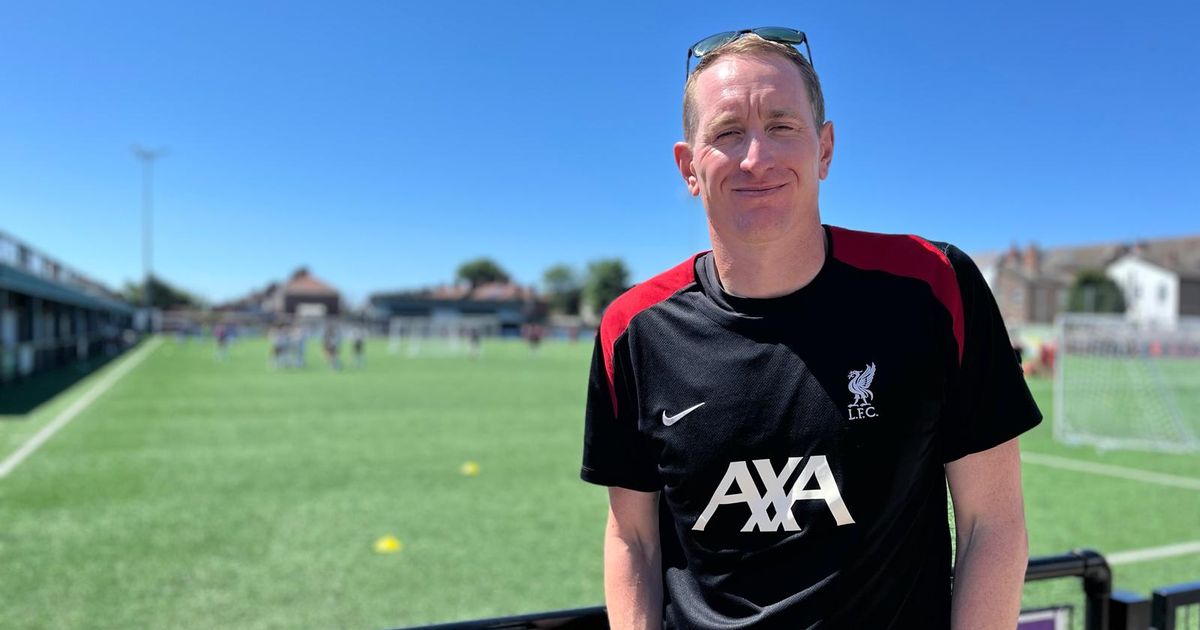Chris Kirkland is now educating others on the dangers of drug usage Chirs Kirkland at an event to raise awareness of ketamine last week at Marine AFC in Crosby(Image: Supplied)
Chirs Kirkland at an event to raise awareness of ketamine last week at Marine AFC in Crosby(Image: Supplied)
A Champions League winner with Liverpool said his addiction to painkillers “ruined his life”. Chris Kirkland became Britain’s most expensive goalkeeper when he made the switch from Coventry City to the Reds for £6m in 2001.
However, Kirkland suffered from a succession of injuries, which was one of the reasons he never fully became the Reds’ number one in goal for his club and England.
Kirkland, originally from Barwell in Lancashire, ousted Jerzey Dudek as first-choice Liverpool keeper at the beginning of the 2004–05 season and played 14 matches before he was again side-lined in December after succumbing to a long-standing back injury.
He had played four Champions League matches but was unable to be named in the squad for the 2005 final due to injury.
In 2022, Kirkland, who now lives in Ormskirk, revealed he was addicted to painkillers for almost eight years. He said he would take 2,500 mg of Tramadol a day, a strong painkiller used to treat moderate to severe pain.
Post-Liverpool, Kirkland’s career saw him ricochet between clubs, including loan stints at West Brom and Wigan – followed by a permanent move to the latter – and further loans to Leicester and Doncaster. However, it was his transfer to Sheffield Wednesday in 2012 that marked a turning point in his pill intake.
Faced with a recurring back injury just before the start of the season, Kirkland took matters into his own hands, self-medicating with Tramadol, which he had previously been prescribed. The looming threat of missing matches due to injury heightened his anxiety, leading him to rely on the medication for mental relief as much as for physical pain management.
Kirkland is now over two years clean. The 44 year-old spoke to the ECHO at an event last week at Marine AFC in Crosby to raise awareness about the dangers of another drug, ketamine.
Reflecting on his own experiences with addiction, Kirkland said: “People say you shouldn’t have regrets but I do. My massive regret is back in 2012.
“My addiction to opium – Tramadol. I wish I’d have said something. It’s easy saying it now, but for the next 10 years, it ruined my life and made a lot of people around me very difficult.
“That’s why I’m very passionate about this now. I try to do a lot of stuff like this. Listen, it was my fault. Nobody forced me to take it. It was my decision and I took the wrong decision.
“That’s why I come to events like this to tell people, ‘listen, you can say no.’ It’s also about trying to help people to realise they can do that and not be peer pressured.
Mental health support
Helplines and support groups
The following are helplines and support networks for people to talk to, mostly listed on the NHS Choices website
- Samaritans (116 123) operates a 24-hour service available every day of the year. If you prefer to write down how you’re feeling, or if you’re worried about being overheard on the phone, you can email Samaritans at jo@samaritans.org.
- CALM Campaign Against Living Miserably (0800 58 58 58) is a leading movement against suicide. It runs a UK helpline and webchat from 5pm to midnight 365 days a year for anyone who has hit a wall for any reason, who need to talk or find information and support.
- PANDAS (0808 1961 776) runs a free helpline and offers a support service for people who may be suffering with perinatal mental illness, including prenatal (antenatal) and postnatal depression plus support for their family or network.
- Childline (0800 1111) runs a helpline for children and young people in the UK. Calls are free and the number won’t show up on your phone bill.
- PAPYRUS (0800 068 41 41) is an organisation supporting teenagers and young adults who are feeling suicidal.
- Mind (0300 123 3393) is a charity providing advice and support to empower anyone experiencing a mental health problem. They campaign to improve services, raise awareness and promote understanding.
- Students Against Depression is a website for students who are depressed, have a low mood or are having suicidal thoughts.
- Bullying UK is a website for both children and adults affected by bullying.
- Amparo provides emotional and practical support for anyone who has been affected by a suicide. This includes dealing with police and coroners; helping with media enquiries; preparing for and attending an inquest and helping to access other, appropriate, local support services. Call 0330 088 9255 or visit www.amparo.org.uk for more details.
- Hub of Hope is the UK’s most comprehensive national mental health support database. Download the free app, visit hubofhope.co.uk or text SHOUT to 85258 to find relevant services near you.
- Young Persons Advisory Service – Providing mental health and emotional wellbeing services for Liverpool’s children, young people and families. tel: 0151 707 1025 email: support@ypas.org.uk
- Paul’s Place – providing free counselling and group sessions to anyone living in Merseyside who has lost a family member or friend to suicide. Tel: 0151 226 0696 or email: paulsplace@beaconcounsellingtrust.co.uk
- The Martin Gallier Project – offering face to face support for individuals considering suicide and their families. Opening hours 9.30-16.30, 7 days a week. Tel: 0151 644 0294 email: triage@gallierhouse.co.uk
- James’ Place – supports men over 18 who are experiencing a suicidal crisis by providing quick access to therapy and support. Call 0151 303 5757 from Monday to Friday between 9.30am and 5.30pm or visit https://www.jamesplace.org.uk/
“Life’s tough at times and people do things you don’t mean to do. But even if you have got caught up in it, you still come back and still tell people you’ve got an issue.
“Tell people if you have used them, that you’ve been pressured into it and you don’t want to do it again. It starts by asking for some help.”
Kirkland has said previously he managed to hide his addiction from his clubs and family by buying the drugs off the internet and hiding them in his car.
During a training camp in Portugal with his final club, Bury, he took so many tablets that he contemplated taking his own life. A last-minute phone call to his wife, who persuaded him to seek help, saved him.
His issues continued after he retired from the game in 2016. On one occasion, a batch of the painkillers he took during lockdown left him “hallucinating and violently sick”.
He added: “I was one of those people that said, ‘if you have to stop or you die, you stop, it’s easy as that with addiction’. It’s not, it’s very tough.
The goalkeeper warned that being high-profile doesn’t protect from falling on hard times. He said: ”I’ve just done a talk at Anfield to a few schools this morning and talked about the football side of stuff.
“I said, it looks great being a footballer, it’s a privileged life. But then I did the other side of things, the addiction and the mental health side and the anxiety side, and it just makes people realise that it doesn’t matter who you are.
“I think the saying is one in four people suffer with mental health difficulties but I think that’s rubbish, I think it’s more like three in four that suffer.
“I want to try and help people along the way and say listen, if you are feeling that way, don’t be ashamed, don’t be embarrassed, don’t be scared.
“The biggest thing you’ve got to do is say, listen, I need some help here and it’s the hardest thing to do because it was for me for 10 years. But when you do it, it’s the relief you get knowing that you’re not on your own and you’ve got a bit of hope. It’s amazing.”
 Chirs Kirkland at an event to raise awareness of ketamine last week at Marine AFC in Crosby(Image: Supplied)
Chirs Kirkland at an event to raise awareness of ketamine last week at Marine AFC in Crosby(Image: Supplied)
Chris said, as a dad, the rise in young people taking ketamine was particularly worrying. The event last Friday LFC Foundation, Marine in the Community, Everton in the Community and Tranmere Rovers in the Community unite for a youth football tournament for year seven boys and girls at Marine AFC in Crosby.
It saw the launch of a new initiative which will continue over the coming months focused on how ketamine can destroy lives and cause serious health issues.
He said: ”Our daughter’s doing her A-Levels at the minute. It’s a constant worry when they go out because we see what’s happening in the world these days.
“It is scary, but all you can do is try and educate them and bring them up and hopefully they’ll follow your advice. But she’s a great kid and she talks to all her friends as well.
“We tell her, check in on your friends and if they’re doing something stupid, tell them. If you’re a real friend, you’ll tell them in the right way.
“And the more people that we can do that, hopefully society, in particular our community on Merseyside, can get a little bit better. That’s why the support now there’s loads of organisations like the LFC Foundation is important.
“I love what I do with the club and what I do now means more to me. I was very fortunate to play football, but trying to help people and give back and help people along the road is very satisfying. You don’t do it for pats on the back. You don’t do it for accolades or for medals or anything like that.”
